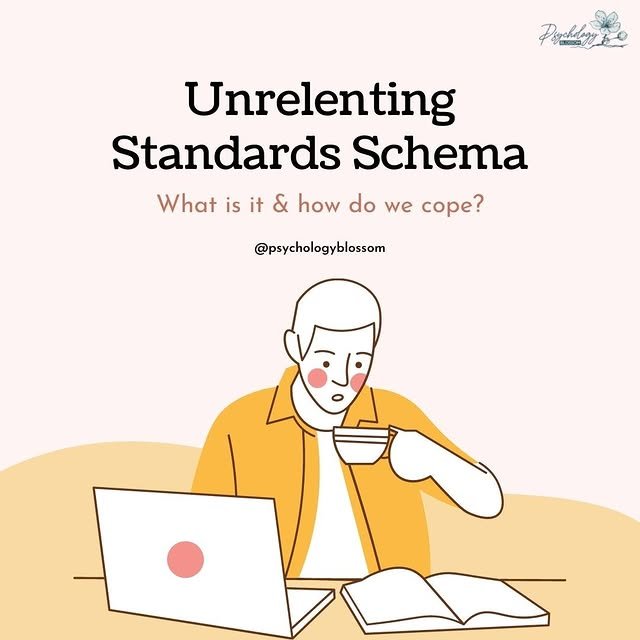Before diving into specific schemas, you might want to read our
introduction to Schema Therapy.
It provides a clear overview of the model and how schemas are understood and worked with in therapy.
Unrelenting Standards Schema: Breaking the Cycle of Perfectionism
Look at the sentences below. Do any of these resonate with you? If they do, you might have an Unrelenting Standards Schema:
- I feel anxious about achieving more in life.
- I feel that I need to be the best at what I do and give 100% at everything.
- I feel that whatever I do, it is not quite good enough.
- I frequently feel anxious that I am wasting time.
- I feel guilty when I sit down and rest because there are things I could be doing to be productive.
What is the Unrelenting Standards Schema?
The Unrelenting Standards Schema is defined as:
“The underlying belief that one must strive to meet very high internalized standards of behaviour and performance, usually to avoid criticism. Typically results in feelings of pressure or difficulty slowing down; and a hypercritical nature toward oneself and others. Must involve significant impairment in: pleasure, relaxation, health, self-esteem, sense of accomplishment, or satisfying relationships.”
Unrelenting standards typically present as one or more of the following:
Perfectionism: inordinate attention to detail, or an underestimate of how good one’s own performance is relative to the norm.
Rigid rules and “shoulds” in many areas of life, including unrealistically high moral, ethical, cultural, or religious precepts.
Preoccupation with time and efficiency, so that more can be accomplished.
When the Unrelenting Standards Schema is activated, it may trigger anxiety and frustration with self and others for not meeting standards or achievements. Those with this schema have a need to feel loved and accepted for who they are rather than what they have achieved.
Living with the Unrelenting Standards Schema
This schema may affect life in profound ways. Emotionally, it can prevent us from meeting needs such as connection, intimacy, relaxation, and joy. People with unrelenting standards often appear successful to others, but internally they may feel exhausted, dissatisfied, and disconnected from their own emotions.
✽ Connection and Intimacy
It is difficult to be in a relationship with someone who has Unrelenting Standards because they are rarely present in the moment. They are constantly thinking about what they have done and what they still need to do. This schema may often lead to workaholism or even substance dependence, such as alcohol misuse, as a way to cope with stress. Partners may feel inadequate or believe they can never “measure up” to the expectations placed on them, straining the relationship further.
✽ Relaxation and Spontaneity
Those with this schema may miss out on having fun, feeling joy, or experiencing contentment. This makes them more susceptible to emptiness, loneliness, and depression in the long term. Even when they achieve career success, it often feels hollow, as though nothing is ever “good enough.”
The impact of the Unrelenting Standards Schema can be significant: exhaustion, burnout, and difficulty experiencing joy. Stress becomes constant, creating the sense that there is never enough time and always something more to do.
Due to ongoing stress and adrenaline, individuals may face health issues. The body’s constant “revved up” state can strain the cardiovascular system, increasing the risk of heart disease and cardiac arrest.
Possible Causes
Family background plays a key role in this schema. It tends to develop in families where self-worth is linked primarily to achievement. In such environments, little importance is placed on emotions, mental health, or relaxation. Instead, emphasis is placed on productivity, grades, or accomplishments.
Children raised in these families may experience criticism more often than praise. Even when they achieve, feedback may focus on what could have been done better rather than celebrating success. This creates a lifelong sense that nothing is ever enough, and that one must always do more to earn approval.
How Do We Manage It?
While deeply ingrained, the Unrelenting Standards Schema can be managed through self-awareness, therapy, and practical changes in daily life. Here are some strategies that may help:
✽ Enjoy Your Successes
Pause and reflect on everything you have achieved. Reward yourself. Instead of looking forward to the next task, be present in the moment. Recognize the journey you have taken and appreciate the hard work, sacrifice, and dedication behind your accomplishments.
✽ Stop the Critical Self-Talk
Remind yourself that you are human and allowed to make mistakes. Rather than dwelling on “what ifs” or regrets, practice acceptance. Give yourself pep talks: “I am human,” “It’s okay to make mistakes,” “No one is perfect,” and “I did the best I could at the time.”
✽ Schedule Breaks Into Your Life
Learn to say no and prioritize self-care. Instead of filling your schedule with endless commitments, create balance. Breaks are not wasted time — they are vital for recharging and maintaining long-term productivity.
✽ Read Inspirational Books
Books such as Reinventing Your Life by Jeffrey Young can be eye-opening. Once you become aware of your schema patterns, you can start to take control and change behaviours. While challenging, this process can lead to deep personal transformation and freedom from perfectionism.
✽ Make Peace With Your Schemas
Your Unrelenting Standards Schema is rooted in negative self-beliefs. By recognizing your patterns, you can learn strategies to weaken their hold. Professional therapy can provide support and accountability, helping you move toward self-acceptance and a more balanced life. Consider seeking professional therapy in Singapore for guidance.
Check out what Julia has learned through her own experience as a perfectionist in the video attached. She shares practical lessons that helped her make life more enjoyable and self-accepting.
We recommend This Video to those who want to learn more about the Unrelenting Standards Schema.

